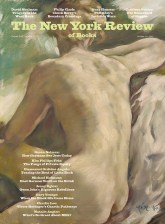In response to:
Poems to Wake the Corpses from the September 21, 2023 issue
To the Editors:
In Anahid Nersessian’s review “Poems to Wake the Corpses” [NYR, September 21], I was surprised to read her insinuation that Joyce Mansour’s use of the French word nègres in a poem first published in 1955 might indicate the author’s hateful and racist attitude, and that my use of the word “blacks” hides these intentions. When making this point, Nersessian fails to consider the poem and context in which Mansour uses the word:
Cry little man
Your boat is for sale
Your wife is sold
And the fresh milk of your cow
Red with the blood of blacks
Makes your children piss
Their hate.
In 1955 African and Asian colonies were demanding and achieving independence. The Paris Surrealists were staunchly antifascist and anticolonialist, and the movement’s founder André Breton promptly expelled Salvador Dalí from the group when the latter expressed fascist sympathies. Furthermore, the poem above leaves little ambiguity about where the author’s sympathies lie with respect to anticolonial movements of the day. It expresses disdain for the “little man” who may have prospered from colonization, slavery, or other forms of exploitation, and whose only remaining legacy to his children is hate.
For Nersessian to imply that Mansour herself is hateful in a poem that is deriding those who are seems odd. Seventy years later, the term nègre, like “Negro,” is outdated and offensive. While there is no perfect solution in terms of translation, I felt that the English word that best reflected the intention of the poet was not an outdated term that would change the tone of the poem, but one that is more reflective of a modern reclamation like the one intended by her fellow Surrealist poet Aimé Césaire.
Emilie Moorhouse
Coeditor and Translator
Emerald Wounds: Selected Poems of Joyce Mansour
Anahid Nersessian replies:
Emilie Moorhouse and I agree that the French word nègre—now widely considered an offensive term—carried a number of meanings in the mid-twentieth century. When Joyce Mansour writes, “le lait frais de ta vache/[Est] Rouge du sang des nègres,” she may have wanted to invoke one, several, or all of them. Moorhouse seems to believe that because Mansour was not a racist she would not have used nègre in a racist sense. I have no idea if Mansour was a racist or not, and would have welcomed some discussion on the subject from Moorhouse and her coeditor.
In his 1955 essay “Antillais et Africains,” Frantz Fanon shows how the connotation of nègre could shift—from “black” to “Negro” to a disturbing racial epithet—in everyday speech depending on the context. In poetry, we are usually dealing with an abundance of contradictory meanings rather than a stable and narrow relationship between a word and its referent. Mansour could, of course, be using nègre in a purely racist sense. Alternatively, she could be using the word as a slur in order to ventriloquize, parody, and condemn racist beliefs she does not share. These are questions of interpretation, difficult to resolve. Simply dismissing the term nègre as “outdated” and refusing to grapple with its history is a strangely languid approach.



